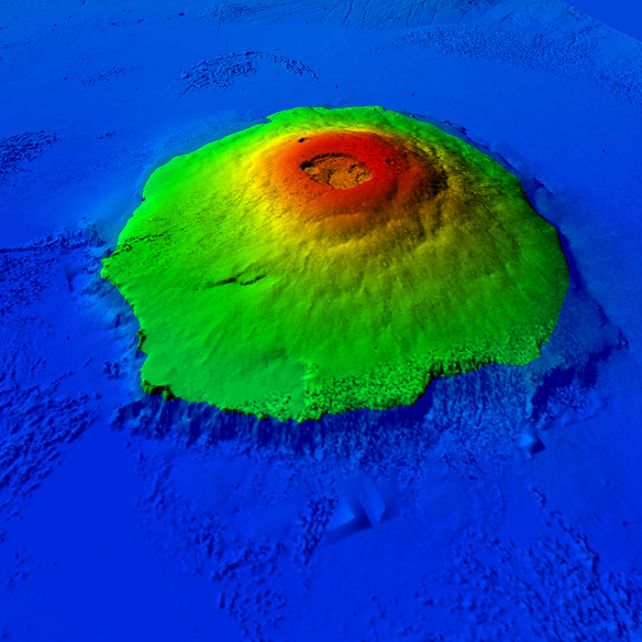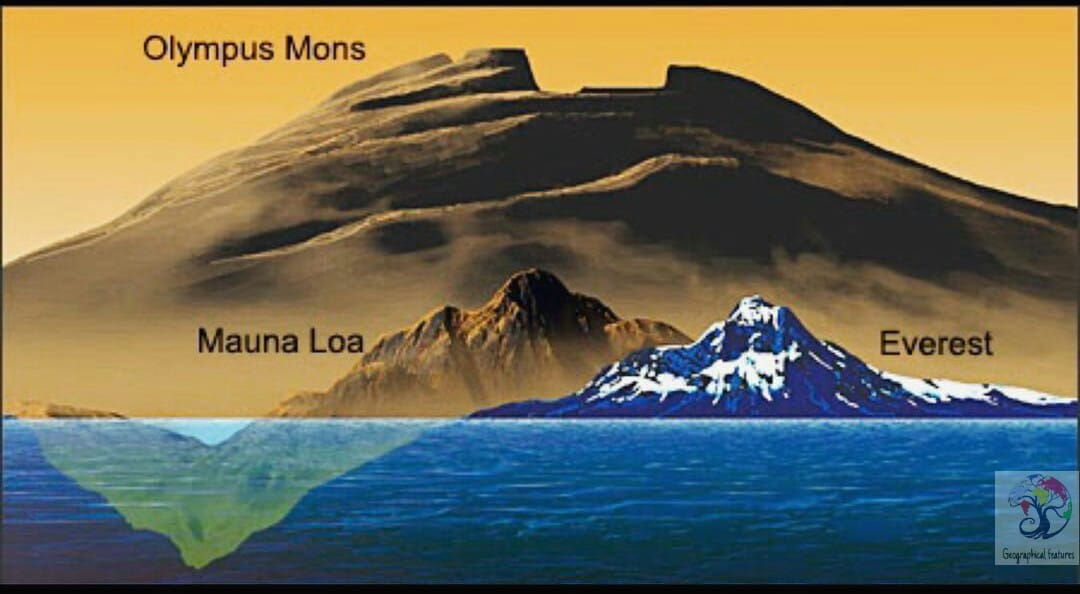It looks like you're using an Ad Blocker.
Please white-list or disable AboveTopSecret.com in your ad-blocking tool.
Thank you.
Some features of ATS will be disabled while you continue to use an ad-blocker.
10
share:
We know Mars was once a place of rivers and oceans in its past so the theory from a team of geoscientist of the Paris-Saclay University in France fits
perfectly with the data gathered over the last 3 decades or so , the team led by geoscientist Anthony Hildenbrand have been looking at the biggest
volcano in the Solar System and equate it with volcanic islands Stromboli or Savai'i here on Earth.

Skull Island ?
"We propose that the upper rim of the 6-kilometer high concentric main escarpment surrounding Olympus Mons most likely formed by lava flowing into liquid water when the edifice was an active volcanic island during the late Noachian–early Hesperian."

Hildenbrand and his colleagues used this information to recontextualize Olympus Mons. They looked at similar shield volcanoes here on Earth. In particular, they studied three active volcanic islands: Pico Island in Portugal; Fogo Island in Canada; and the island of Hawaii in the US.
They found that the shorelines of these islands have sharp escarpments, similar to the escarpment that rings Olympus Mons. On Earth, these escarpments are the result of sharp contrasts in lava viscosity due to differential cooling as it transitions from air to water.
"This leads us to propose that Olympus Mons was a former volcanic island surrounded by liquid water," the researchers write in their paper.
www.sciencealert.com...
Skull Island ?
The scale of Olympus Mons is incredible when compared to geologic formations on our humble planet.
This image puts it into perspective:
This image puts it into perspective:

edit on 7272023 by seattlerat because: (no reason given)
Cool stuff...
First thought and pardon my naivety in volcanology.
To have formed like that it had to be a massive eruption and fairly quick, or at least the last one was. Could the massive volcanic eruption have been the start of a chain reaction event(s) leading to Mars losing its atmosphere? even if it didn't the atmosphere must have been a toxic smog for eons.
Fully expect to be schooled here but liquid water requires a fairly robust atmospheric layer does it not?
First thought and pardon my naivety in volcanology.
To have formed like that it had to be a massive eruption and fairly quick, or at least the last one was. Could the massive volcanic eruption have been the start of a chain reaction event(s) leading to Mars losing its atmosphere? even if it didn't the atmosphere must have been a toxic smog for eons.
Fully expect to be schooled here but liquid water requires a fairly robust atmospheric layer does it not?
a reply to: putnam6
I don't know but I think it's likely as Mars was a volcanic world in its past , the size of Olympus Mons alone must have played a part given it was believed to have been active for hundreds of millions of years , Mars is about half the size of Earth so all that venting could have played it's part .
Mars was much like Earth in its distant past with a thick oxygen rich atmosphere and a stronger magnetitic field to protect it from Solar radiation , it's possible life started on Mars and migrated (Panspermia)here as conditions there were more favourable than here at the time.
Could the massive volcanic eruption have been the start of a chain reaction event(s) leading to Mars losing its atmosphere?
I don't know but I think it's likely as Mars was a volcanic world in its past , the size of Olympus Mons alone must have played a part given it was believed to have been active for hundreds of millions of years , Mars is about half the size of Earth so all that venting could have played it's part .
Fully expect to be schooled here but liquid water requires a fairly robust atmospheric layer does it not?
Mars was much like Earth in its distant past with a thick oxygen rich atmosphere and a stronger magnetitic field to protect it from Solar radiation , it's possible life started on Mars and migrated (Panspermia)here as conditions there were more favourable than here at the time.
edit on 27-7-2023 by gortex because: (no reason given)
a reply to: seattlerat
Gravity on Mars is 40% of earth Volcano can grew larger before gravitational effects limit its size
Gravity on Mars is 40% of earth Volcano can grew larger before gravitational effects limit its size
a reply to: firerescue
I was thinking more King Kong , biggest volcano in the Solar System deserves biggest monkey but yeah Gilligans island would do.
I was thinking more King Kong , biggest volcano in the Solar System deserves biggest monkey but yeah Gilligans island would do.
originally posted by: firerescue
a reply to: seattlerat
Gravity on Mars is 40% of earth Volcano can grew larger before gravitational effects limit its size
Wouldn't 60% less gravity mean a particularly violent eruption could possibly expel tons of ejecta out of the atmosphere, where it could coalesce or be collected to be Panspermia all over the barren earth.
originally posted by: gortex
a reply to: putnam6
Could the massive volcanic eruption have been the start of a chain reaction event(s) leading to Mars losing its atmosphere?
I don't know but I think it's likely as Mars was a volcanic world in its past , the size of Olympus Mons alone must have played a part given it was believed to have been active for hundreds of millions of years , Mars is about half the size of Earth so all that venting could have played it's part .
Fully expect to be schooled here but liquid water requires a fairly robust atmospheric layer does it not?
Mars was much like Earth in its distant past with a thick oxygen rich atmosphere and a stronger magnetitic field to protect it from Solar radiation , it's possible life started on Mars and migrated (Panspermia)here as conditions there were more favourable than here at the time.
Always dig your posts always something interesting always educational and a got a new word of the day "Panspermia" from one grows another. It means planets could be like dandelions, or pine cones where somewhere in their life processes they seed the system they are in.
Perhaps we get certain components from Mars or other planets, some come from other asteroids or comets, isn't one of Jupiter's moons full of nitrogen ice volcanos?
a reply to: putnam6
I think it's highly likely , as the song says "we are stardust" and over the years that truth has become apparent.
Perhaps we get certain components from Mars or other planets, some come from other asteroids or comets, isn't one of Jupiter's moons full of nitrogen ice volcanos?
I think it's highly likely , as the song says "we are stardust" and over the years that truth has become apparent.
a reply to: gortex
I have nothing to say other than I love all of the information and possibilities when it comes to Mars. We live in very interesting times as human beings. We have achieved information overload! (think about it)
It is like a giant Hawaii.
Very cool, thanks for the info.
S&F
I have nothing to say other than I love all of the information and possibilities when it comes to Mars. We live in very interesting times as human beings. We have achieved information overload! (think about it)
It is like a giant Hawaii.
Very cool, thanks for the info.
S&F
a reply to: Darkblade71
The more we learn about Mars the more it becomes obvious , to me at least , that there was life on Mars and there likely still is life beneath the surface of the Red Planet , with various Moons around the Solar System looking likely to also be home to life we do indeed live in interesting times.
The more we learn about Mars the more it becomes obvious , to me at least , that there was life on Mars and there likely still is life beneath the surface of the Red Planet , with various Moons around the Solar System looking likely to also be home to life we do indeed live in interesting times.
new topics
-
Just learned a really helpful trick for internet searches
Computer Help: 5 minutes ago -
Not off to a good start
General Chit Chat: 1 hours ago -
If they can see...they can read!!
Rant: 9 hours ago
top topics
-
Tesla Cybertruck Explodes in Front of Trump Hotel in Las Vegas
Mainstream News: 14 hours ago, 19 flags -
If they can see...they can read!!
Rant: 9 hours ago, 6 flags -
Maybe they didn't get away with it: The Lincoln-Kennedy assassination parallels. 7 sentences long.
History: 16 hours ago, 4 flags -
Not off to a good start
General Chit Chat: 1 hours ago, 2 flags -
Just learned a really helpful trick for internet searches
Computer Help: 5 minutes ago, 0 flags
active topics
-
Just learned a really helpful trick for internet searches
Computer Help • 0 • : Flyingclaydisk -
Vehicle Strikes people in New Orleans
Mainstream News • 247 • : xWorldxGonexMadx -
Not off to a good start
General Chit Chat • 3 • : billxam1 -
If they can see...they can read!!
Rant • 8 • : AlroyFarms -
DONALD J. TRUMP - TIME's Most Extraordinary Person of the Year 2024.
Mainstream News • 43 • : Imhere -
How we've changed in 100 years
Ancient & Lost Civilizations • 19 • : Flyingclaydisk -
Tesla Cybertruck Explodes in Front of Trump Hotel in Las Vegas
Mainstream News • 58 • : Flyingclaydisk -
Mood Music Part VI
Music • 3774 • : Hellmutt -
SCOTUS Chief Justice JOHN ROBERTS Ends 2024 Describing His Fears for Safety of U.S. Judges.
Above Politics • 11 • : WeMustCare -
-@TH3WH17ERABB17- -Q- ---TIME TO SHOW THE WORLD--- -Part- --44--
Dissecting Disinformation • 3880 • : WeMustCare
10
